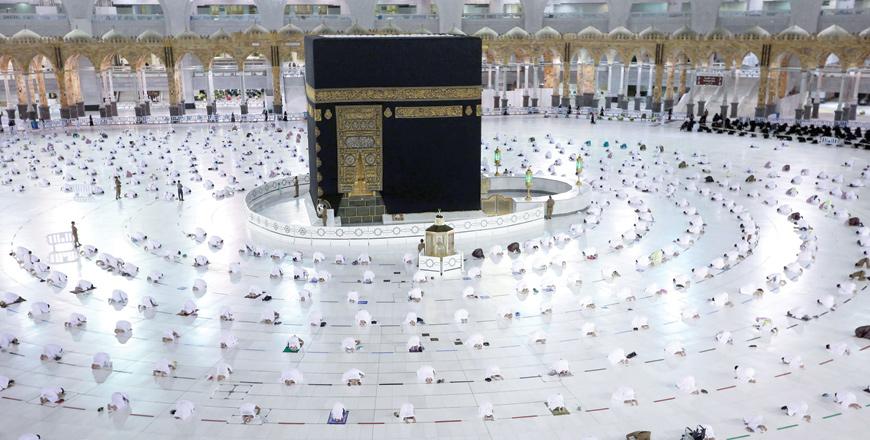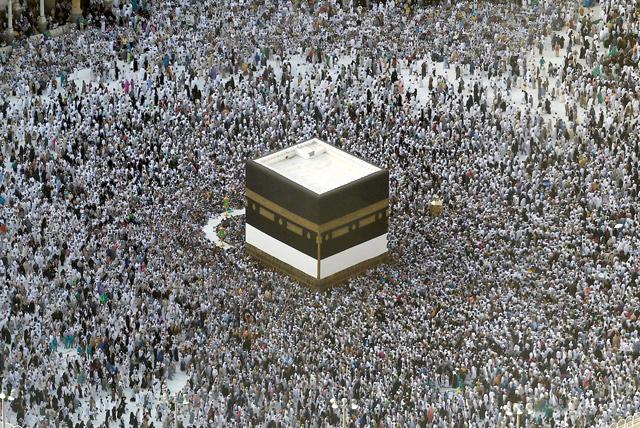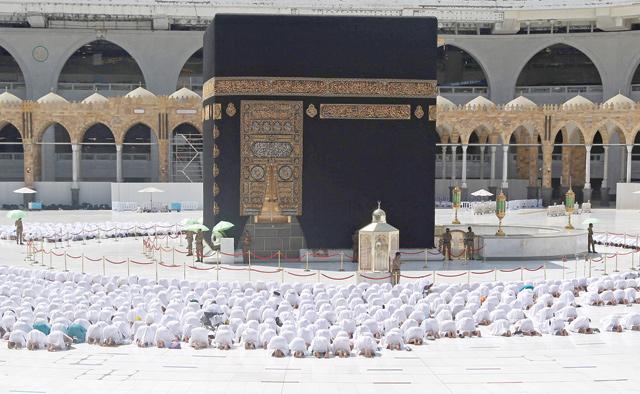You are here
Saudi Arabia to reopen borders for vaccinated umrah pilgrims
By AFP - Aug 08,2021 - Last updated at Aug 08,2021

In this file photo taken on April 13, Muslim worshippers perform the evening Tarawih prayer during the fasting month of Ramadan around the Kaaba in the Grand Mosque complex in the holy city of Mecca (AFP photo)
RIYADH — Saudi Arabia will begin accepting vaccinated foreigners wanting to make the Umrah pilgrimage, authorities said on Sunday, a move that will boost an economy hit by the COVID pandemic.
Nearly 18 months after it closed its borders to battle coronavirus, Saudi Arabia will from Monday begin "gradually receiving Umrah requests from various countries", the Saudi Press Agency (SPA) reported.
The Umrah can be undertaken at any time and usually draws millions from around the globe, unlike the annual Hajj, which abled-bodied Muslims who have the means must perform at least once in their lifetime.
The COVID-19 pandemic hugely disrupted both Muslim pilgrimages, which are usually key revenue earners for the kingdom that rake in a combined $12 billion annually.
Before Sunday’s announcement, only immunised pilgrims residing in Saudi Arabia were eligible for Umrah permits.
And last month only around 60,000 inoculated residents were allowed to take part in a scaled down form of the annual Hajj.
But the kingdom is slowly opening up, and has started welcoming vaccinated foreign tourists since August 1.
Foreign pilgrims must be immunised with a Saudi-recognised vaccine — Pfizer-BioNTech, AstraZeneca, Moderna and Johnson & Johnson — and agree to undergo quarantine if necessary, the SPA said quoting Deputy Hajj Minister Abdulfattah Bin Sulaiman Mashat.
He added that the kingdom was working on determining the destinations from which pilgrims can come and their numbers on a “periodic basis according to the classification of preventive measures” in those countries.
Relief
Barring overseas pilgrims has caused deep disappointment among Muslims worldwide, who typically save for years to take part.
“I feel relieved about the resumption of the umrah pilgrimage,” Ahmed Hamadna, 33, a sales manager in Egypt, told AFP.
But he added that he was “concerned about the complex procedures and measures during the pandemic”.
Engineer Mohamad Ragab, an Australian resident, said he too was still “hesitant” to perform the umrah pilgrimage.
“There will likely be crowds in Mecca and the chances of infection are high,” he said.
According to the SPA report, Saudi Arabia will allow 60,000 pilgrims to perform umrah each month, and gradually increase that to reach two million worshippers per month.
Hosting the pilgrimages is a matter of prestige for Saudi rulers, for whom the custodianship of Islam’s holiest sites is their most powerful source of political legitimacy.
Riyadh has spent billions trying to build a tourism industry from scratch, as part of efforts to diversify its oil-reliant economy.
The once-reclusive kingdom began issuing tourist visas for the first time in 2019 as part of an ambitious push to revamp its global image and draw visitors.
Between September 2019 and March 2020, it issued 400,000 of them — only for the pandemic to crush that momentum as borders were closed.
The government has accelerated a nationwide vaccination drive as it moves to revive tourism and other pandemic-hit sectors, such as sport competitions and entertainment extravaganzas.
Vaccination is mandatory for anyone seeking to enter government and private establishments, including education institutions and entertainment venues, as well as to use public transport.
Saudi Arabia has registered nearly 532,000 coronavirus cases and more than 8,300 deaths.
The Hajj, one of the five pillars of Islam, is usually one of the world’s largest religious gatherings, with 2.5 million taking part in 2019.
Related Articles
RIYADH — Saudi Arabia announced Saturday it will allow 60,000 residents vaccinated against COVID-19 to perform this year's Hajj, but Muslims
MECCA — The Grand Mosque in Islam's holiest city of Mecca operated at full capacity Sunday, with worshippers praying shoulder-to-shoulder fo
RIYADH — Saudi authorities said Monday only people immunised against COVID-19 will be allowed to perform the year-round umrah pilgrima













